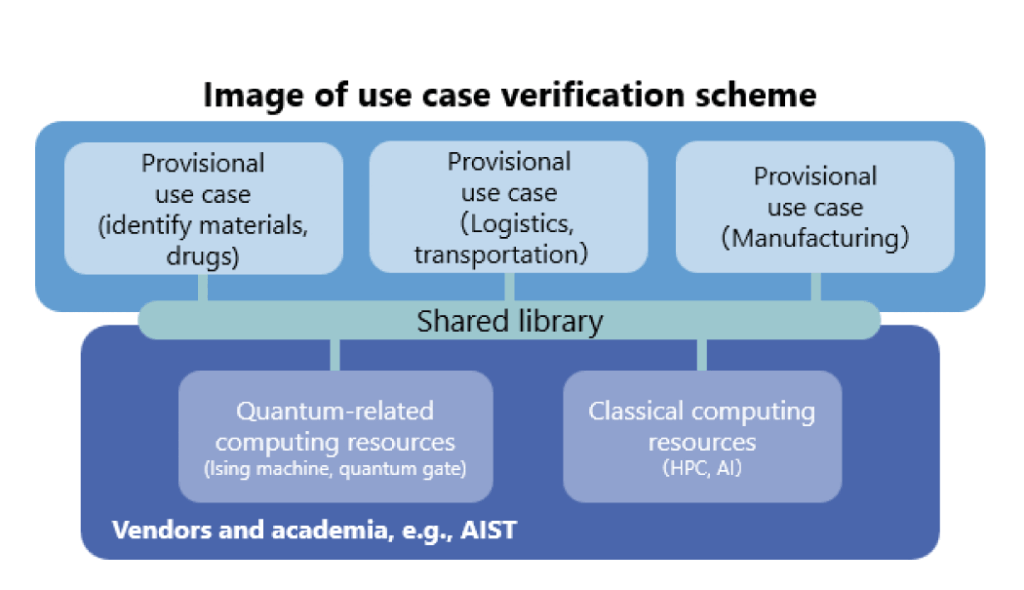What is a quantum computer?
First, let’s get the “what is a quantum computer “out of the way. A quantum computer is a computer that computes using the principles of quantum mechanics. Conventional computers (classical computers) use “bits”(classical bits), the smallest unit of data, to perform calculations in digital circuits.1 bit represents either 0 or 1 value. In contrast, a quantum computer uses a “qubit” as its basic unit. A qubit has a curious property called “superposition, “in which the state of a bit being 0 and the state of a bit being 1 overlap. This property enables a quantum computer to represent multiple states simultaneously and to perform high-speed parallel computing. Quantum computing technology can be divided into Ising-type (annealing-type) and gated-type, depending on the principle of operation.
-1024x513.jpg)
Ising type (annealing type)
Processing is performed using “quantum annealing,” a quantum algorithm specialized for combinatorial optimization problems. Although it is not as versatile as the gated type, it can achieve computation more simply than the gated type, and is already being applied to actual business applications.
Gate type
The calculations are performed using electronic circuits called “quantum gates.” Various realization methods have been proposed, including superconducting circuits, semiconductor quantum dots, light, ions, and cooled atoms (neutral atoms). It is capable of general-purpose calculations and is expected to be applied in all fields, such as optimization calculations, prime factorization, and chemical simulations, but it has not yet reached the level of practical application in business.
What is quantum inspired ?
Although the Ising type (annealing type) is being used in practice, a method has been developed that uses existing digital circuit technology to mimic the computational principles of the Ising type and process complex calculations on a conventional computer (classical computer) at high speed. This is called “quantum inspired” (also called “Ising machine,” “annealing,” etc.). Since quantum inspired is a technology that mimics a quantum computer, it is not a “quantum computer” in the strict sense of the term, but is included in “quantum computing technology” in the broad sense. This point should be noted because confusion can easily lead to major misunderstandings about the timing of practical applications. Although it is a large-scale system, it runs on an ordinary computer running on semiconductors and does not require special hardware to handle qubits. Quantum inspired is an area in which Japan has an advantage.
Current Status and Applications of Quantum Computing Technology Development
As mentioned earlier, quantum computers can be divided into gated and Ising (annealing) types. Both apply the principles of quantum mechanics, but they differ in their computational methods.
The gated type can perform general-purpose calculations, but is susceptible to external noise and lacks error tolerance. For this reason, the debate is divided, with some saying it will take several decades for practical application and others believing that practical application will be possible by 2030. On the other hand, the Ising type (annealing type) is already being applied in business and can be used immediately to solve business problems. Moreover, the technique of quantum inspired allows specialized calculations for combinatorial optimization problems to be performed on ordinary computers without the need for special hardware.
One of the specific application areas of the Ising-type (annealing-type) is transportation and logistics. It is expected to improve delivery efficiency and reduce costs by searching for optimal logistics routes among numerous routes, thereby addressing the “2024 logistics problem. Other real-world applications are also attracting attention in such fields as materials development, drug discovery, manufacturing, and finance.
Accelerating Social Implementation towards the Quantum Computer Era
A combinatorial optimization problem is the problem of finding the best combination of solutions from a huge number of alternatives under various constraints.
In a rapidly changing business environment, it is essential to make quick decisions. Currently, companies are moving toward DX by utilizing digital technologies such as AI and IoT, and data from all kinds of corporate activities are being visualized. Quantum computing technology comes into play when, for example, production planning or optimization of logistics sites based on collected data, or when optimal solutions are to be derived from a vast array of options by taking into account complex constraints. In particular, Ising-type (annealing-type) computers are already in commercial use, and quantum inspired in particular is a technological field in which Japan excels, with immediate business applications possible. It is important to actively use this technology for all kinds of issues, from the complex to the familiar, and to begin putting it into practice.
In preparation for the era of quantum computing, Q-STAR is working daily to create practical and wide-ranging use cases and industrialize them by combining Japan’s strength in quantum inspired and various existing technologies such as AI (machine learning), which is becoming increasingly relevant.

